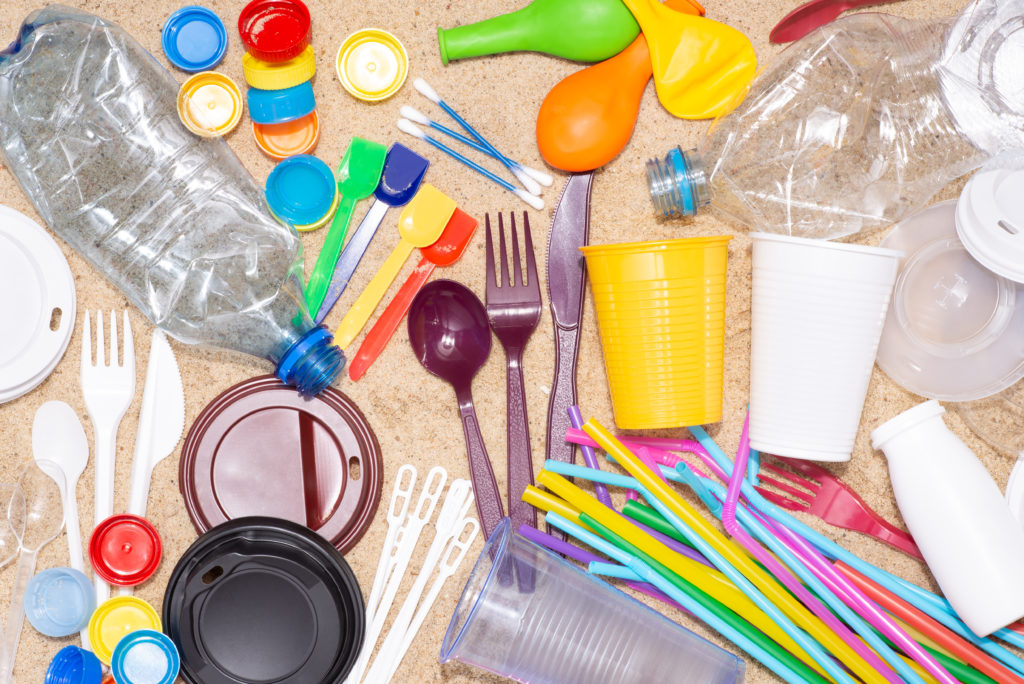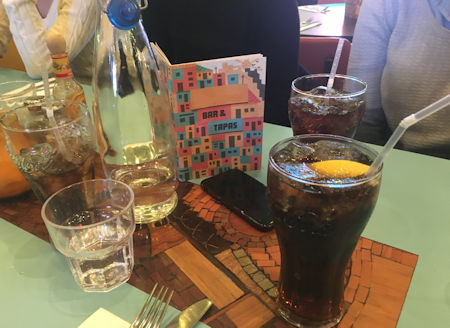Single use plastic products are no longer just being discouraged – both the UK and the European Union are set to make some of these products illegal. As Defra produces draft legislation banning plastic straws, cotton buds and stirrers and the EU continues work on its SUPs directive, Lucy Pegg examines the details of the upcoming laws.
Single use plastic products, often known as SUPs, have littered the headlines in recent years – and soon they will be on the statute book too.

Legislation to ban single use plastic is being developed in the UK and EU parliaments (image: Shutterstock)
From plastic drinks bottles to the wrapper on your sandwich, law makers in both the UK and EU governments are working to crack down on the waste created by these everyday items.
In the next five years policy on SUPs will see a number of items banned, with Extended Producer Responsibility schemes and taxes brought in to discourage the consumption of other disposable plastics.
Defra
Amidst the announcements and arguments over Brexit, some within Westminster are working on more niche projects – including a proposed 2020 ban on plastic straws, cotton buds and stirrers.
The ban was first announced by the then Prime Minister, Theresa May, in April 2018 and is now set to come into force in England on 6 April 2020, after draft legislation for it was published this week.
If passed by parliament it will become an offence to supply an end user with a single use plastic straw, cotton bud or stirrer, with those who break the ban facing a fine or compliance order.
But despite the apparent ‘ban’ on these single-use products, there are a number of exceptions included in Defra’s draft legislation.
As well as ensuring that plastic straws remain accessible for medical and accessibility purposes, it is also proposed that plastic straws attached to drinks containers (like juice cartons) remain legal. Straws will also remain available with food and drinks that are to be consumed immediately.

Theresa May announced the UK’s ban on plastic straws, cotton buds and stirrers in 2018, whilst she was Prime Minister
It will be legal to provide straws in a care home, premises used for early years provision, schools and all detention facilities too. Exemptions will be made so that cotton buds with plastic sticks can be used in scientific or forensic work.
The public appetite for legislation of this type has been noted by the government. In its response to a consultation on the new law, Defra highlighted the “extraordinary levels of public interest in the issue of plastic waste and litter” – 1602 responses to the consultation were received from industry, campaign groups and members of the public.
European Union
The EU is working on its own legislation to restrict the use of SUPs which, once implemented, will go further than that so far being proposed in Westminster.
In March the European Parliament approved measures proposed by the European Commission which hope to tackle marine litter by limiting the use of disposable plastic. This includes bans on selected single-use plastic items for which non-plastic alternatives exist – including expanded polystyrene food and beverage containers and all products made of oxo-degradable plastic, as well as specific items like cotton bud sticks, cutlery and sticks for balloons.
These bans will come into action on 3 July 2021. It has been made clear that biodegradable plastic options will not be considered as SUP alternatives by the Commission.
Definitions
Key to this policy are the EU’s definitions of the single use plastics it includes in its ban. In the text of the directive published in June, the EU stated that it would provide further clarification of what is considered to be a single-use plastic for the purpose of the legislation.
Letsrecycle.com understands that a number of member states have sought clarification on terms such as ‘packets and wrappers’, ‘beverage containers’, ‘bottles’ and ‘cups for beverages’ which the directive uses.
Packets and wrappers are defined as flexible materials which contain food for immediate consumption without further preparation. These criteria are all linked to the likelihood that the packet or wrapper will be used on-the-go, which leads to an increased risk of littering.
Examples include sandwich, chocolate bar or ice cream wrappers, as well as crisp and nut packets under 150 grams.
The bottles and cups definitions are largely self-explanatory. Plastic drinks bottles over two litres will not be included as they are less likely to be littered, unlike their smaller counterparts which will be covered by the ban – again the Commission has noted that the likelihood of littering has a “decisive role” in the definition of materials as SUPs.
Plastic drinks pouches containing a single portion and disposable cups for both hot and cold drinks – including those sold in multipacks in supermarkets – will be affected by the ban too.
Discussions are still underway as to whether metal or glass single-use containers – such as drinks cans or glass beverage bottles – will be exempt. These items are found less frequently on beaches in the EU, but their exemption may be reviewed.
Cartons
Perhaps controversially, the SUPs ban at this stage looks likely to include plastic-lined cardboard cartons – such as those produced by Tetra Pak – because they are a receptacle used to contain liquid and are not intended for multiple uses.

CEOs of ACE’s member companies BillerudKorsnäs, Elopak, SIG Combibloc, Stora Enso and Tetra Pak, who have set up GRACE
Whilst trade group the Alliance for Beverage Cartons and the Environment (ACE UK) claims that plastic-lined cartons are easily recyclable through pulping and separation of the non-paper layers, they face some criticism as a hard to recycle material and the non paper layers have at times been sent to energy recovery. (see letsrecycle.com story)
The beverage carton industry this month set up the Brussels-based Global Recycling Alliance for Beverage Cartons and the Environment (GRACE) which says it seeks to “strengthen the beverage carton position as low carbon, sustainable and recyclable packaging”.
Petra Gerber of carton producer SIG Combibloc – who is also president of ACE – said the industry was well-placed to respond to the desire for sustainable packaging.
She explained: “Beverage cartons have unique attributes such as being able to safely transport and store food and beverages, have a low carbon footprint and are recyclable.
Tetra Pak itself says it supports the objectives of the single use plastic directive and is “committed to addressing the issue of plastic waste”.
A spokesperson said they were working on developing solutions to comply with the new requirements they could face, both in the UK and the EU.
“We have mobilised our development team to enable us to supply the global market with alternatives to the plastic straws which are sometimes attached to our packages. This includes developing paper straws, tethered caps and other solutions.”
They explained: “We have mobilised our development team to enable us to supply the global market with alternatives to the plastic straws which are sometimes attached to our packages. This includes developing paper straws, tethered caps and other solutions.”
“Our ambition is to deliver a package that contributes to a low carbon circular economy, that is, a package made entirely from renewable and/or recycled materials that is fully recyclable, without ever compromising on food safety requirements.”
Expert Group on Waste
Alongside the work on definitions, the EU’s Expert Group on Waste have also outlined a vast amount of other work which must be done to facilitate the SUPs directive.
A timeline for a number of the measures was set out. As well as the 3 July 2021 date for bans on the SUPs listed above, the same deadline has been given for member states to transpose the directive into their own legal systems. Marking requirements for single use items like sanitary towels and wet wipes will be legislated on by the 3 July 2021 date too.
Product requirements for beverage bottles and packaging which relate to tethered caps and lids are due to occur by 3 July 2024. An Extended Producer Responsibility (EPR) system for some SUPs will be implemented by 31 December 2024 – this will cover disposable containers for food for immediate consumption and lightweight carrier bags.
Related links
UK draft legislation on plastic cotton buds, straws and stirrers ban
EU single use plastic directive
Single use plastic definition tables
The post UK and EU prepare for single use plastic bans appeared first on letsrecycle.com.
Source: letsrecycle.com Plastic



